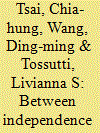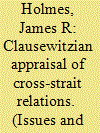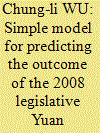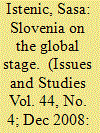|
|
|
Sort Order |
|
|
|
Items / Page
|
|
|
|
|
|
|
| Srl | Item |
| 1 |
ID:
086458


|
|
|
|
|
| Publication |
2008.
|
| Summary/Abstract |
The evolution of a multiparty system in Taiwan has seen public opinion about the independence/unification issue coinciding with partisan positions. While aggregate public opinion data have shown that most Taiwanese support the current cross-Strait relations, or "status quo," less is known about the stability of individual policy preferences. Drawing on panel data from Taiwan's Election and Democratization Study (TEDS) project, this article examines whether the same respondents maintained the same position on the constitutional question in 2001 and 2004. Using ordered probit modeling, it also assesses the impact of previously-held opinions and rational assessments on attitudes in 2004, net of standard sociological and psychological determinants. We find that nearly half of respondents changed their preferences between 2001 and 2004. When opinions did change, there was a trend toward support for the status quo from a pro-unification position. In addition to showing the lag impact of a previous attitude, our analysis confirms that self-identified nationality, partisanship, and rational assessments of Taiwan's economy are significant predictors of positions on the independence/unification issue.
|
|
|
|
|
|
|
|
|
|
|
|
|
|
|
|
| 2 |
ID:
086457


|
|
|
|
|
| Publication |
2008.
|
| Summary/Abstract |
This article uses the strategic theory of Carl von Clausewitz to analyze how the 2008 elections in Taiwan and the United States may influence cross-Strait relations. The elections will affect governments, citizens, and armed forces, and thus the value Taiwan and the United States attach to preserving the island's de facto independence from the mainland. Surveying likely interactions across the Taiwan Strait, it is hard to avoid the conclusion that the China-Taiwan-U.S. strategic triangle includes one power, China, whose Clausewitzian "trinity" remains uniformly locked on eventual unification with Taiwan and whose patience is finite; a second, Taiwan, whose government and people are ambivalent and whose military preparations are lagging; and a third, the United States, whose government and people have priorities that do not include a clash with China, whose military is shrinking, and whose officer corps wants to avoid fighting in the Strait. This mismatch in political commitments and capabilities suggests that, far from bringing about an enduring rapprochement, the elections have done little to dispel potential conflict in East Asia.
|
|
|
|
|
|
|
|
|
|
|
|
|
|
|
|
| 3 |
ID:
086461


|
|
|
|
|
| Publication |
2008.
|
| Summary/Abstract |
Although Margaret Keck and Kathryn Sikkink formulated the concept of a transnational advocacy network (TAN) as a tight-knit community of transnational nongovernmental individuals with shared beliefs and identities, they did not go on to trace the dynamics of the development of such a network. This paper claims that "shared values" is an insufficient explanation for network-building. It further expands on the analytical framework for the development of a TAN by discussing the following three main themes: (1) the political opportunity that catalyzes the emergence of the activists; (2) the network "glue" that facilitates cohesion and closeness in the TAN; and (3) the network organization that defines the participation and problems related to role distribution with respect to the activists in the TAN. This study examines the case of the anti-Yasukuni TAN comprising activists from Taiwan, South Korea, and Japan, and finds that the TAN was transformed in terms of its function and strategy as activists of different national origins joined it. From the evidence gleaned from structured interviews, it was found that activists from Taiwan instilled the TAN with a revolutionary character that facilitated the mobilization of wider social support. Ambitious activists from South Korea then added a greater international dimension to the TAN. Although the groups from Taiwan and South Korea tended to accelerate the development of the TAN and diversify it, the Japanese group reminded the developing TAN of its original target. Thus, a TAN is a far more complex entity with a mixture of multinational and cultural attributes rather than a simple and steady network formed by transnational actors with shared beliefs, as Keck and Sikkink have posited.
|
|
|
|
|
|
|
|
|
|
|
|
|
|
|
|
| 4 |
ID:
086463


|
|
|
|
|
| Publication |
2008.
|
| Summary/Abstract |
Over the past decade, North Korea has been undergoing a severe economic crisis, resulting in extreme food shortages, and this has inflicted great suffering upon the North Korean people. Given such dire realities in the country, it is beyond all doubt that the North Korean government must carry out comprehensive economic reforms as quickly as possible, in order to transform North Korea's present inefficient socialist planned economic system into a market economy. Many, including myself, are of the view that economic reform would certainly lead to successful economic growth in North Korea, and this would in turn enhance the legitimacy of the North Korean regime itself. Nonetheless, the regime has consistently avoided carrying out economic reform, despite being presented with many good opportunities to succeed in doing so. The July First reforms of 2002 have been half-heartedly and inconsistently applied. This then raises a simple, but very important, question: Why has the North Korean government consistently avoided adopting comprehensive economic reforms? The present study pinpoints North Korea's unique monolithic system of political control and policymaking, which has the highest level of power concentration in one individual of all political systems, as the biggest barrier to economic reform. Despite the dire need for reform, the current North Korean regime has avoided it for fear of undermining this monolithic system.
|
|
|
|
|
|
|
|
|
|
|
|
|
|
|
|
| 5 |
ID:
086456


|
|
|
|
|
| Publication |
2008.
|
| Summary/Abstract |
The 2008 Legislative Yuan elections in Taiwan were held under a new electoral system, a combination of single-member districts with a plurality system, the national nonpreferential list proportional representation system, and the single nontransferable vote system for the aboriginal districts. This work develops a forecasting model and hypothesizes that the partisan voting behavior of Taiwan's citizens largely remains identifiable and durable. There are two methodologies used in this study. The first is the use of three-wave aggregate-level electoral data to estimate the outcomes of the 2008 legislative elections. The second employs ordinary least squares (OLS) estimations to evaluate the effects of previous three-wave electoral results on the 2008 elections. Using the first method, the forecast success rate is more than 80 percent. The findings also reveal that the OLS model performs satisfactorily because two of the three coefficients reach statistical significance. This study concludes by listing three implications of the election: that it was a critical watershed in Taiwan's politics, that there is a geopolitical gap between the north and south, and that minor political parties were eliminated from Taiwan politics.
|
|
|
|
|
|
|
|
|
|
|
|
|
|
|
|
| 6 |
ID:
086460


|
|
|
|
|
| Publication |
2008.
|
| Summary/Abstract |
After seventeen years of independence and successful integration into the European Union (EU) and the North Atlantic Treaty Organization (NATO), Slovenia is gradually establishing its role in the international community and proving its ability to act on the world stage. Recently, Slovenia successfully completed a term as president of the EU, the first of the 2004-2007 entrants to hold the presidency, thus proving that it is well-integrated into the workings of Brussels. Slovenia is an enthusiastic participant in a thriving European regionalism which has increased the EU's desire to become a more effective global actor in international security. The EU's emerging interaction with Asia has provided Slovenia with an opportunity to get involved in Asian affairs and take part in the enhancement of the EU's political and security role in the Asian region. The Taiwan Strait is a dangerous flash point that might trigger a war in Asia and have dramatic repercussions on the EU and its member-states. The EU has gradually awakened to the need to develop its own security perspective on China and to form its own approach toward the contentious cross-Strait issue. EU accession and Europeanization have given Slovenia increased weight and enhanced its ability to contribute to world peace.
|
|
|
|
|
|
|
|
|
|
|
|
|
|
|
|
| 7 |
ID:
086459


|
|
|
|
|
| Publication |
2008.
|
| Summary/Abstract |
The purpose of this paper is to develop the context for Taiwanese economic statecraft based on the evolving paths of economic integration within the Association of Southeast Asian Nations (ASEAN) and the less obvious market-driven and complex changes in business supply chains. Taken together, the effects of economic statecraft, trade patterns, and investment constitute a "noodle bowl" with many unintended consequences. The effect is to undermine particular policies and initiatives and make the ASEAN Economic Community (AEC) much more porous than its policies suggest. The many inconsistencies between policies and effects should be seen as providing an opportunity for Taiwan to continue its dynamic role in Asian markets and to avoid isolation.
|
|
|
|
|
|
|
|
|
|
|
|
|
|
|
|
|
|
|
|
|